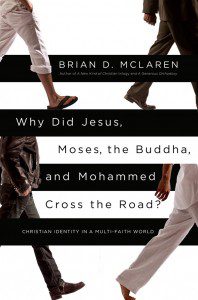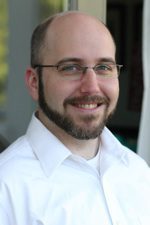By Scott Mitchell
[This post is part of an inter-faith response to Brian McLaren’s new book Why Did Jesus, Moses, the Buddha and Mohammed Cross the Road? now hosted at the Patheos Book Club.]
 Reading Brian McLaren’s book, I couldn’t help but feel like I was being invited to dinner, to break bread with someone who is passionate and sincere and deeply committed to inter-religious conversation. I want to join him at this dinner party because I believe, as he does, that the stakes are high. We are living in a time where the bifurcation of the world into “us” and “them” has global economic, political, and environmental consequences. So we’d better figure out how to live together.
Reading Brian McLaren’s book, I couldn’t help but feel like I was being invited to dinner, to break bread with someone who is passionate and sincere and deeply committed to inter-religious conversation. I want to join him at this dinner party because I believe, as he does, that the stakes are high. We are living in a time where the bifurcation of the world into “us” and “them” has global economic, political, and environmental consequences. So we’d better figure out how to live together.
Brian needs to come to the Graduate Theological Union, where I work as a teacher of Buddhist Studies. It is in this context that I can lead a seminar where a Baptist minister, a Unitarian Universalist, a Theravada Buddhist, a Jodo Shinshu Buddhist, and a Mormon feminist can discuss the Rev. Martin Luther King’s theology of love and its relevance to engaged Buddhist chaplaincy and prison outreach. From this context, the world doesn’t seem bifurcated at all; rather, each of us is able to share our particular experiences of the spiritual while appreciating our common humanity, free from fear of the other. We’re all in this together.
This is what I’ve learned in my tenure as a teacher here, how to appreciate our common humanity. This is made possible in part because I work in an environment where everyone is allowed to speak, where we are encouraged to listen, and we hold competing world views in mind, no matter how challenging or conflicting, to best understand our religious others.
It is this wrestling with difference that makes part of Brian’s book difficult for me. When he speaks of all religions being reflections of the Holy Spirit, when he says that “we can understand human religions…as imperfect human responses to our encounters with the Spirit who is present in all creation” [p. 152], I must protest. This view (all too similar to the “many-paths-one-mountain” metaphor for religious difference) is, frankly, condescending. It is a way of saying, “When the Buddha experienced the interconnection of all sentient beings under the bo-tree at his awakening, he wasn’t really experiencing nirvana – it was actually the Holy Spirit.”
I recognize that this chapter is not meant for me; I recognize that Brian is working out a specific type of theology for concerned Christians. But Brian’s work is part of a larger movement of post-religious, post-modern Christianity. An integral part of post-modern thought is the idea that truth is not singular. The idea that there is no singular truth, that there may be multiple truths that somehow coexist – that must coexist – can be unsettling. But it is crucial if we want to truly understand our religious others. To really understand another, we need to understand their truth on their own terms. We cannot overlay their experiences with our own categories, our own heuristic typologies. Approaching inter-religious conversation from the point of view that all religions are essentially the same precludes the possibility of understanding the other on her/his own terms.
I do not believe that Jesus’ message wasn’t really inspired by the Holy Spirit but was, in fact, his tapping into some Buddhist version of compassion. I recognize that it is possible that Jesus’ experience of the spiritual was entirely different from the Buddha’s. And that’s okay. I need to understand Jesus on his own terms, not mine. And I trust that Christians – at least the type of Christians Brian describes in his book – will want to understand the Buddha on the Buddha’s terms.
Brian’s book reads like he’s inviting us all over for dinner. I applaud him for inviting each of us to the table so that we can come to better understand one another. This is vital, important work. And it needs to be done from a place of true understanding, a place made possible by hearing the other on her/his own terms. From this place, we can understand the other as they are, expressing their own religious identity with the strength and kindness that Brian has expressed his.
 Scott Mitchell teaches at the Institute of Buddhist Studies at the Graduate Theological Union in Berkeley, California, and the co-host of the DharmaRealm podcast.
Scott Mitchell teaches at the Institute of Buddhist Studies at the Graduate Theological Union in Berkeley, California, and the co-host of the DharmaRealm podcast.












